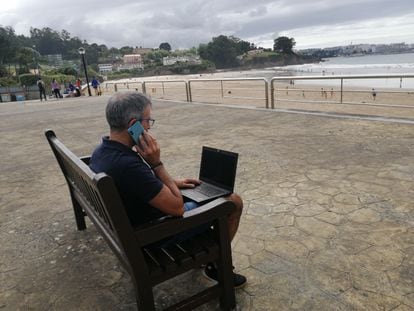Spain’s new decree on working from home – everything we know so far
A preliminary agreement was reached on Monday by the government, unions and business associations on a legal framework for teleworking, something that was not a common practice in the country until the coronavirus pandemic hit
/cloudfront-eu-central-1.images.arcpublishing.com/prisa/OU4F7YO2LQLTG5ABQRTZH6I2V4.jpg)

The Spanish government, unions and business associations reached a preliminary agreement on Monday on a new decree that regulates remote working, which until a few months ago was an uncommon practice in Spain. That situation changed with the start of the coronavirus pandemic in March, with teleworking prioritized in a bid to reduce contagion. In response to this shift, the government, unions and business associations have been looking for a legal framework to manage the change in work practices. Now, after months of negotiations, new regulations on the rights of remote workers are expected to be approved this Tuesday by Spain’s lower house of parliament, the Congress of Deputies.
Although the final details are not yet known – the preliminary agreement still needs to be ratified by unions and industry chiefs – the last draft of the text outlined under what circumstances the new law will be applied, who will cover expenses and how work schedules will be organized.
Here are the main points covered by the new regulations.
What is considered remote work?
Working part time from home or even the occasional entire day will not be considered as teleworking, but rather a flexible working condition. For the new rules to apply, an employee must work at least 30% of their total hours remotely within a period of three months, which is the equivalent to one-and–a–half days a week.
This was the point of greatest conflict between the CEOE-Cepyme business association and Spanish unions UGT and CCOO. Initially, the percentage was set at 20%, but industry representatives pushed for it to be increased to 30%.
Who will cover expenses?
This was another hotly contested issue during the negotiations. In the end, the decree states that it is up to the company to cover the cost of the provision and maintenance “of all resources, equipment and tools” needed by a worker to carry out their job remotely, according to the terms established in a collective negotiation or in an agreement with the business.
The text also states that the company must pay for or compensate a worker for the running costs of this equipment, given that the employee cannot be responsible for covering the expenses for the resources they need to carry out their job. How the company will assume these costs or compensate the worker will be established by a collective contract or via an agreement between the business and the legal representatives of the workers, according to the decree.
Will companies and workers need to sign an agreement?
Yes. The decree states that a written agreement must be drawn up between the worker and the company. The employee has 10 days to deliver this text to their representatives, who then need to submit it to the employment office.
Although the details of the agreement will be established in the collective negotiation, the decree says that a “mandatory minimum of content” regarding a worker’s personal needs must appear in the document. The latest draft of the decree lists 11 points on this subject, such as an inventory of the equipment needed to work remotely; what expenses a worker may incur and how they will be compensated; the work schedule and, if applicable, how hours will be divided between the office and teleworking; the site chosen for teleworking; the measures available to the company to monitor the worker remotely; the length of the agreement and work instructions. The draft also states that the agreement must set out how much notice must be given if the situation is reversed.
Does the decree guarantee a flexible working schedule?
Yes, but the text states that a company may set out time periods when the worker must be available. In other words, the schedule is flexible – in accordance with what is established in the teleworking agreement and the collective negotiation, and as long as the regulations on working hours and breaks are respected – but a company and a worker can negotiate whether the employee must be available during set time periods.
Is it voluntary?
Yes. The decree states that teleworking is voluntary for both the worker and the employer. Both parties can also reverse the decision, a right that must be exercised according to the terms of the collective negotiation or the agreement between staff and the company.
The decree outlines that within these agreements, the company and worker will also be able to modify the percentage of hours that must be worked on-site, and set criteria and terms to move from working on-site to remotely, and vice versa.
Can the company monitor remote workers?
Yes, but the last draft of the decree does not clarify how. The test that is set to be approved on Tuesday simply says that a business will be able to adopt measures that it considers “more opportune for surveillance and control” to ensure that teleworkers are doing their job. This may even include remote monitoring methods, as long as they respect the dignity of the worker.
When will the new regulations take effect?
Although the government decided to approve the regulation via decree, a faster mechanism than the draft bill initially considered, this does not mean that it will take effect immediately after it is published in the Official State Gazette (BOE). Business associations have insisted on the inclusion of a transitional provision, which by de facto, will delay the introduction of the new rules. This provision was another source of disagreement during the negotiations.
The decree states that in situations where teleworking has arisen due to the coronavirus pandemic and the declaration of the state of alarm in March – in other words for exceptional circumstances – it will not be mandatory for workers and companies to sign an agreement. This means that the formal obligations established in the decree are suspended, although the company will have to provide the employee with the resources they need to work remotely.
The text also outlines that if the employer and staff already have internal regulations on teleworking, the new framework will only apply once this document has expired. If there is no set period for the internal rules, the new decree will come into effect one year after its publication in the BOE, although both parties can agree to wait up to three years before applying the new rules.
Are remote workers guaranteed the same rights?
The decree states that remote workers will have the same rights that they would if they were working on-site. For this reason, the text states that teleworkers can not be disadvantaged in terms of financial retribution, post occupancy, working hours, training or professional promotions. The decree recognizes that a teleworker has the same rights regarding work-life balance and joint responsibility, and also guarantees the right to disconnect.
English version by Melissa Kitson.

/cloudfront-eu-central-1.images.arcpublishing.com/prisa/OU4F7YO2LQLTG5ABQRTZH6I2V4.jpg)










































